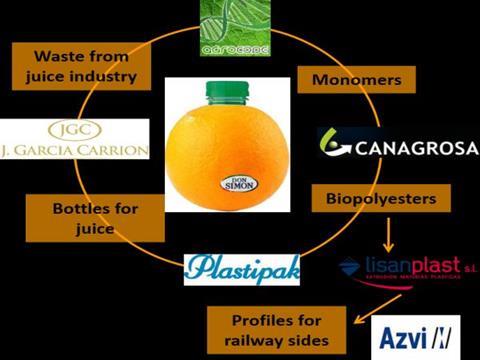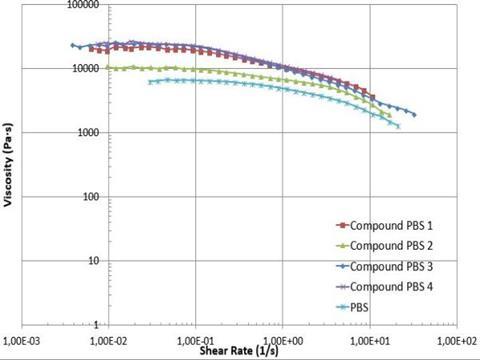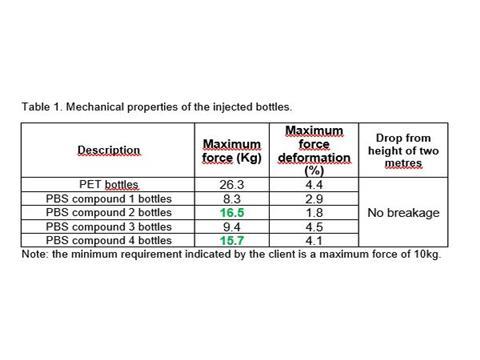
The project MIPLASCOE, framed within the call Innterconecta, seeks to recover the wastes generated in the orange juice sector productive activity through the extraction of different monomers by microbial fermentation and the synthesis of biopolyesters that, after a subsequent modification, expect to have the properties appropriate for its use in profile extrusion and for the production of bottles by injection blow moulding.
by M.P. Villanueva, extrusion department, E. Benavent, design and Injection department and M.A. Valera, compounding department.
One of the objectives of this project, in which companies like J. GARCIA CARRION, AGROCODE, CANAGROSA, PLASTIPAK, LISANPLAST and AZVI are taking part together with the University of Seville, the Polytechnic University of Valencia and AIMPLAS is the development of PBS compounds to obtain bottles by injection stretch blow moulding. In this paper, the preliminary results obtained in the development of PBS compounds from commercial grades to analyze the suitability of this new biopolymer in the injection blow moulding process and the final properties in the bottles obtained are shown.
BIOVEGE has been granted by the Centre for the Development of Industrial Technology (CDTI) through the programme Innterconecta and supported by the Spanish Ministry of Economy and Competitiveness
Injection blow moulding from commercial PBS
For the manufacturing of preforms a multicomponent injection equipment has been used. To obtain the final bottles a blow moulding machine has been used, equipped with a carousel for the gradual heating of the preforms by infrared radiation lamps.
The preform injection process of the different PBS commercial grades assessed has not shown any difficulty at the technical level, but in contrast it has not been able to blow the preforms to obtain bottles. PBS has physical characteristics that avoid to reach a uniform temperature in the preform surface during the heating stage, so the preforrm is not stretched properly inside the mould.
Modification of commercial PBS
Noting that any of the commercial PBS grades are adequate for obtaining bottles by means of Injection Stretch Blow Moulding, AIMPLAS has developed new PBS compounds in a co-rotating twin-screw extruder. The modification of commercial PBS has been performed in order to:
- Favor the absorption of infrared radiation during the heating stage of the PBS preforms.
- Improve the stretching and moulding of preforms to make possible the obtaining of bottles with a good distribution of thicknesses, as well as with mechanical properties suitable to package orange juice.
The image below shows the rheology curves measured at 180ºC on the new PBS compounds developed, as well as the behavior of the commercial PBS used as the starting material. The physical-mechanical modifications performed in PBS have allowed to increase the starting viscosity of this material. The viscosity increases achieved have been positive for the heating, stretching and blow moulding of the preforms.

New bottles obtained from PBS compounds and their properties
From the PBS compounds obtained, preforms have been injected and bottles have been blown. All the formulations have been adapted to obtain a bottle geometry of 0.5 litres capacity. However, the results in mechanical and optical properties are different depending on the type of compound. The transparency of the new bottles is lower to PET’s, due to the crystallinity of PBS, but some compositions show a transparency suitable for the packaging of liquid products like juices, which in many cases are packaged even in HDPE bottles and a high transparency is not required.
In order to determine the mechanical properties of bottles two different test were performed; compression tests in vertical empty bottles and vertical drop tests with full bottles to determine the impact strength.
Table 1 shows the results of the compression and impact resistance tests. The bottles with reference materials like PET have a maximum force of 26kg. The samples obtained with PBS compounds have a maximum compression force lower than this value, but values up to 16.5kg are reached, above the value required by the client to package orange juice in bottles with a capacity of 0.5 litres, fixed at 10kg.
The impact strength of all the bottles was tested by means of a drop test from a height of two metres for bottles full of water and with a cap. In the case of bottles made of PBS compounds, no breakage was observed in none of bottles tested.

Conclusions
In the trials conducted so far, it has been found that the commercial PBS grades currently available do not have the properties appropriate for their transformation by injection stretch blow moulding to obtain bottles.
AIMPLAS has successfully developed injected bottles from PBS compounds with a good balance between their mechanical properties (compression and impact strength), transparency and processability in conventional lines designed to obtain PET bottles.
The bottles, with a capacity of 500ml, obtained in a pilot plant line, show that such PBS compounds will be suitable for obtaining bottles in clients’ facilities by using their current technology in which they produce orange juice bottles with the same capacity. Scale-up of the process will be carried out in the coming months before the project ends. These results will allow PLASTIPAK to be the first company in introducing on the market a bottle made from PBS and gain leading positions in the European market as a company manufacturing biodegradable and compostable packages for juice, in particular in the national market.
More info:














